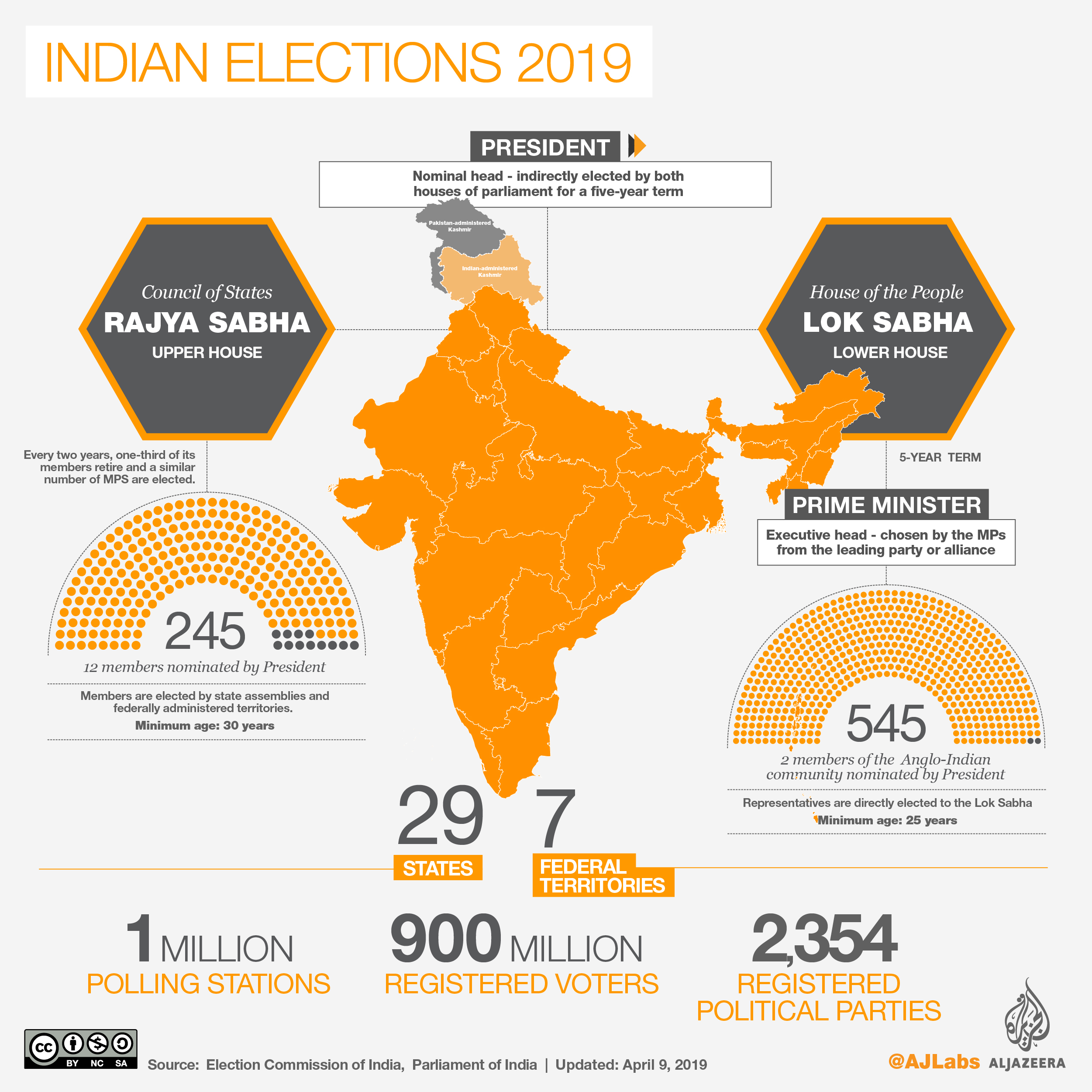Voters in Delhi and elsewhere in India's north have lined up to cast their ballots in the second last round of a seven-phase general election, with the opposition seeking a united stand to deny Prime Minister Narendra Modi a second term.
More than 100 million people across seven states are eligible to vote in the sixth phase of the poll, which began on April 11 and will end on May 19. Votes will be counted on May 23.
Sunday's voting in 59 constituencies, including seven in the Indian capital, will complete polling for 483 of 543 seats in the lower house of parliament. The voting for the remaining 60 seats will be held next Sunday.
Turnout in the first five phases averaged 67 percent, nearly the same as in 2014 elections that brought Modi to power.
Opinion polls say the Hindu nationalist Bharatiya Janata Party (BJP) continues to be the frontrunner, but it is likely to return with fewer than the 282 seats it won in 2014.
The BJP captured 31 percent of votes in 2014, but it won more than half the seats to wrest power from the Congress party in a first-past-the-post electoral system in which a candidate who receives the most votes wins.
Lok Sabha Election 2019: Total 50.77% voting till 4 pm in #Phase6. West Bengal- 70.51, Delhi-45.24, Haryana- 51.86 Uttar Pradesh- 43.26, Bihar- 44.40, Jharkhand- 58.08, Madhya Pradesh- 52.78 pic.twitter.com/0UKFGtWAPt
— ANI (@ANI) May 12, 2019
Referendum on Modi rule
Modi is running his campaign like a presidential race, a referendum on his five years of rule with claims of helping the poorest with benefits, free healthcare, providing toilets in homes and giving women free or cheap cooking gas cylinders.
At the same time, he is banking on stirring Hindu nationalism by accusing the Congress party of being soft on nuclear rival Pakistan, pandering to minority Muslims for votes and indulging Kashmiri separatists.
Opposition parties accuse Modi of digressing from the main issues affecting nearly 70 percent of the population living in villages and small towns.
The opposition is challenging him over India's 6.1 percent unemployment rate - the highest in decades - and the economic difficulties of farmers hurt by low crop prices that have led many to take their own lives.
Opposition officials have also alleged corruption in a deal for India to purchase French fighter jets.
Rahul Gandhi, 48-year-old scion of the Nehru-Gandhi family and the Congress party president, has accused Modi of buying 36 French Rafale fighters jets at an exorbitant price, and helping a private industrialist by promoting him as an offset partner of Dassault, the aircraft manufacturer.
"It was a good fight," Gandhi said after he cast his vote. "Narendra Modi used hatred, we used love. And I think love is going to win."
Visuals of voters from outside a polling booth in Mayur Vihar Phase-3 (East Delhi Constituency). #LokSabhaElections2019 #Phase6 pic.twitter.com/4XwPuwxwNr
— ANI (@ANI) May 12, 2019
India's opposition parties have recently taken heart at what they see as signs the BJP is losing ground and have begun negotiations over a post-election alliance even before polling ends on May 19.
Some voters in Delhi said they were backing Modi because they were won over by his tough stand on security.
"I have voted for Modi's sound foreign policy and national security," a 36-year old first-time voter who declined to be identified told Reuters news agency.
Nilanjan Mukhopadhyay, a political commentator and Modi's biographer, calls the Hindu nationalist leader "the most visible prime minister".
But he adds: "There could be an element of fatigue also. People at the end of it are looking at their bottom line. I think the issues of employment and rural distress are very important."
 |
| Congress president Rahul Gandhi shows his ink-marked finger after casting his vote at a polling station in New Delhi [Adnan Abidi/Reuters] |
Personal attacks
Political analysts say that state-based and caste-driven parties could be decisive in determining the make-up of the next government, as a lack of new jobs and weak farm prices have hurt the BJP.
"Regional parties will play a bigger role compared to the previous five years or even 15 years," said KC Suri, a political science professor at the University of Hyderabad. "They will regain their importance in national politics."
Recent weeks have also been marked by personal attacks between leaders, including comments from Modi about the family of Rahul Gandhi.
At a recent rally Modi called Gandhi's late father, former Prime Minister Rajiv Gandhi, "Corrupt No. 1". The BJP says Modi was reacting to Rahul Gandhi calling him a thief.
"The political vitriol has become intense, and negatively intense," said Ashok Acharya, a political science professor at the University of Delhi.
"It seems as if this particular election is all about a few political personalities. It is not about issues, any kind of an agenda."
 |
https://www.aljazeera.com/news/2019/05/india-elections-2019-voting-penultimate-190512044847266.html
2019-05-12 11:15:00Z
52780290072734
Tidak ada komentar:
Posting Komentar